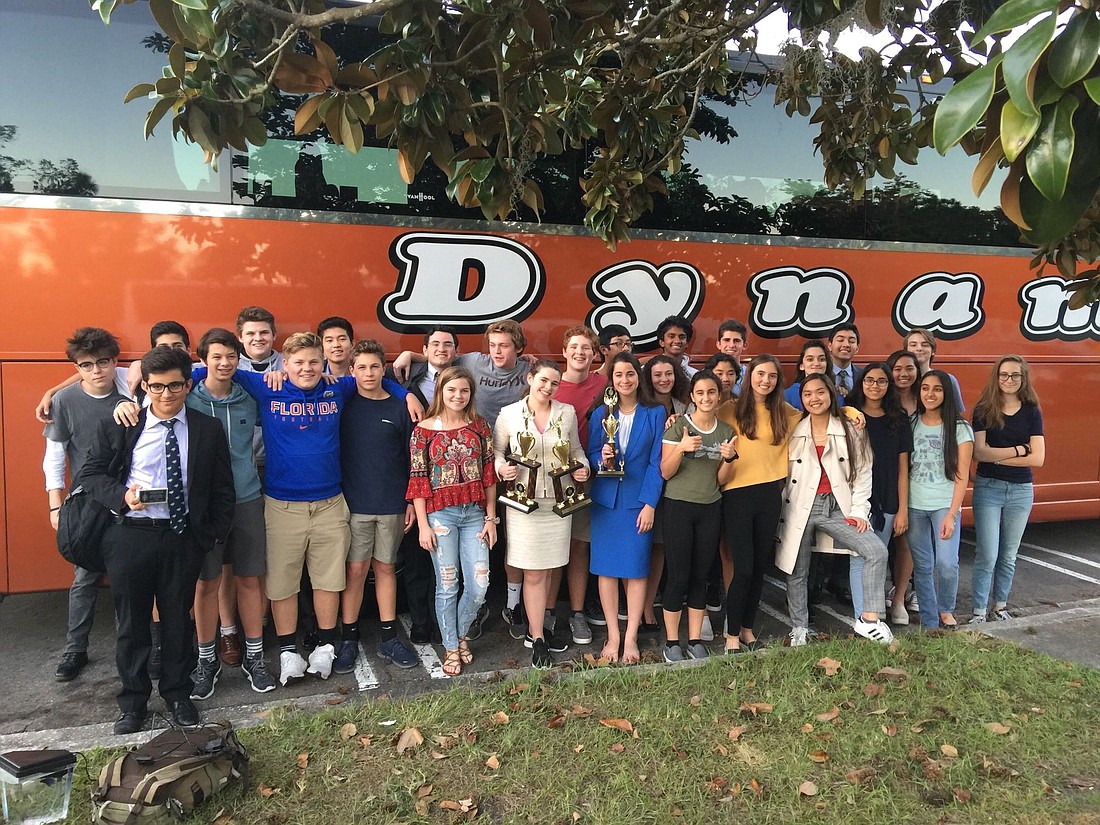- April 18, 2024
-
-
Loading

Loading

Whether it’s speech, debate or interpretation, Trinity Preparatory School has the last word when it comes to competition.
The Trinity Prep forensics program continues to achieve success and receive national recognition, placing high in competitions on a consistent basis.
The Winter Park private school competes in about 25 tournaments a year — locally and even nationally at places such as Yale and Harvard.
In the past few years, the team has had a national champion in poetry interpretation in student Lalee Ibssa, as well as a Silver Division Tournament of Champions championship duo in public forum debate last year in Katie Rohrbaugh and Alexis Huang.
“At national tournaments around the country, we find ourselves at elimination rounds pretty much every tournament — whether that be top 24, top 12, top six — pretty much wherever we go,” said Director of Forensics Nathan Johnston, who has led the program for the last three years. “The team has also grown a lot. We’re up to about 75 kids, which is pretty impressive considering Trinity has about 120 in each class. We have a pretty serious percentage of the school that actually participates in the forensics team.”
Forensic events are divided into three categories: debate, speech and interpretation, an event in which a student takes a piece of literature or another creative work and interprets it.
“All of those events are one person representing the school in an event,” Johnston said. “At the end of the day, they are going to compete individually and try and place individually. In a lot of ways, it kind of functions like a track meet does. Whatever place you get earns your team a certain number of points.
“There are two events where the kids do not compete by themselves,” he said. “There’s duo interpretation of literature — which is two people acting out a piece together — and then there’s public forum debate — which is a partner style of debate.”
The forensics team recently was named to the National Speech and Debate Association’s 200 Club — a prestigious honors society through the association.
The points earned by students in competition add up to what are called “degrees” — or point milestones. The recent recognition is a result of the 2017-18 school year, where the program earned itself 200 degrees.
It marks another accolade for a program that has enjoyed success since it was first started in the 1980s by Dean Rhoads. Instructor Darcy Butrimas eventually took over and ran the program until retiring a few years ago.
“Between the two of them, they really grew the team into this regional and national powerhouse,” Johnston said.
“Over the course of those 30 years, those two, along with a variety of other coaches (who) have been with the program for some point, really built something special. We’re proud of what we’ve built so far, and we think we’re doing a good job keeping it going.”
The forensics team brings together a diverse group of students
“Kids get involved in the activity for a variety of reasons,” Johnston said. “Some of them get involved because they like things like talking about international politics or domestic issues and they like arguing and doing research. Some of them might want to join the team because they want to become better public speakers. Others in the acting events really enjoy kind of the theater aspect. … They like cutting together different pieces of poetry to form arguments about social issues going on in society.”
Whatever the reason, Johnston hopes the program gives participants improved research skills, an ability to analyze evidence and more confidence as a public speaker.
“There’s a good portion of the kids (who) end up joining the team (who) are actively looking for their voices and ways to use those voices,” Johnston said. “I think this gives them a really good outlet to do that.”
Next semester, Johnston will take over the middle-school forensics class, as well, so the school soon will be able to start a middle-school program and compete.